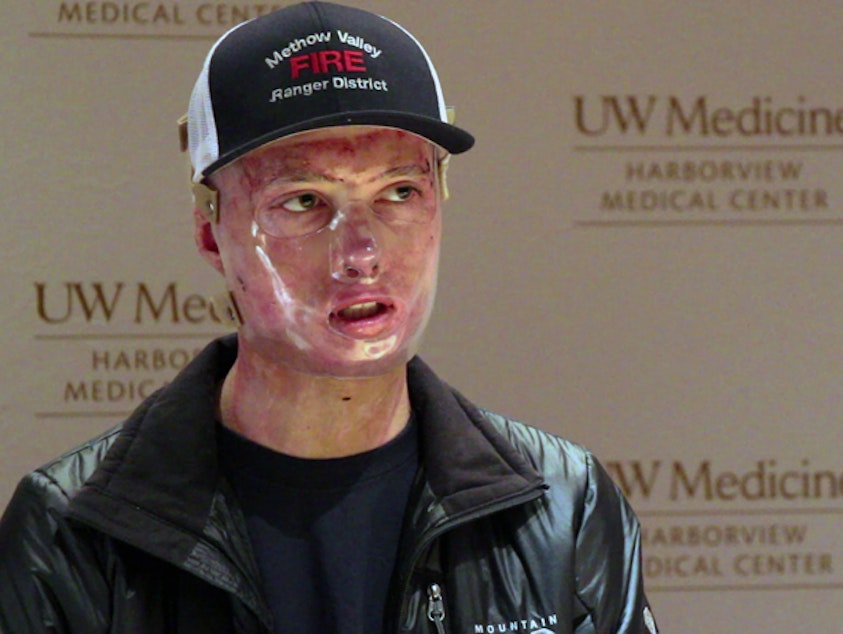Burned Firefighter Ready To See His Dog, Get Outside

A firefighter critically injured in a deadly wildfire in eastern Washington last summer left Harborview Medical Center on Wednesday after three months in the hospital.
“This accident was a true tragedy, but it’s brought out so much good in the world,” said Daniel Lyon Jr., wearing a clear protective mask to limit scarring from the severe burns on his face. “I’ve never seen so many gracious people in my life.”
Lyon had been at Harborview since Aug. 19, when the fire truck he was in ran off the road during a wildfire near the Twisp River in the Methow Valley. Three firefighters were killed; Lyon was the sole survivor. At a news conference at the hospital Wednesday, he urged people not to forget his friends who died: Tom Zbyszewski, 20; Andrew Zajac, 26; and Richard Wheeler, 31.
“Aug. 19, that was definitely the scariest day of my life,” Lyon said as his parents, Daniel Sr. and Barbara, looked on. “But I got to share that day with some really great firefighters. I’ll never forget telling one of those guys that if I had to go into any fire, it would be with him.”
Dr. Nicole Gibran, director of the UW Medicine Regional Burn Center at Harborview, said Lyon, who suffered burns over 60 percent of his body, still has a long way to go.
Sponsored
“I think that he’s made a remarkable recovery. His journey is not over,” Gibran said. “We know that he’s going to deal with itching. We know that he’s going to deal with scarring.”
His fingertips were amputated because they were so deeply burned, Gibran said.
Lyon said his pain level has been manageable, but his mental struggle has been tougher.
“Little things like smelling smoke from a burning toaster oven will trigger memories of that day. And hearing a smoke detector go off sets you in panic,” he said. “Those guys are on my mind on a constant basis. The pain of that is way harder than any physical pain you can imagine.”
Gibran said that one of the things that saved Lyon’s life was that his lungs weren’t as badly injured as they might have been. And she said having a good support system also played a role in his survival.
Sponsored
Lyon said he had received hundreds of cards from around the world, and he thanked his family, doctors and other firefighters and the Forest Service for standing by him.
“I can’t wait to get back home, see my dog, be more active," he said.
“Right now my hands are my biggest struggle. I can’t move them a whole lot,” Lyon said. “Initially when I get out of here, not having my independence fully is going to be tough for me.”
He acknowledged that there's still a lot of work ahead.
“The doctors have stressed that it’s going to be a full-time job now plus overtime for me to be active and constantly moving my joints to battle that scar tissue that’s building up 24/7,” he said.
Sponsored
But he said his goal was to go back into law enforcement – he was a reserve officer with the Milton department.
“I can’t climb mountains right now. But I can climb hills,” he said. “And that’s exactly what I plan to do, work my way up to it.”


